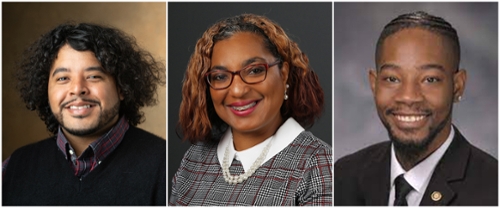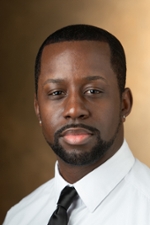Black America/White America, SIUE Holds Discussion on Contrasts
 America for many Blacks is experienced and seen as systematically biased and racist towards them. America for many whites is realized as a place of privilege and power. These were recurring points made and expounded upon during the panel discussion, “Black America, White America (A Conversation about Present-day American Segregation),” hosted by the Southern Illinois University Edwardsville Department of Political Science and the SIUE Black Heritage Month Committee.
America for many Blacks is experienced and seen as systematically biased and racist towards them. America for many whites is realized as a place of privilege and power. These were recurring points made and expounded upon during the panel discussion, “Black America, White America (A Conversation about Present-day American Segregation),” hosted by the Southern Illinois University Edwardsville Department of Political Science and the SIUE Black Heritage Month Committee.
 The virtual panel discussion, formed as part of the fourth annual Political Science Black Sociopolitical Lecture Series (PSBSLS), was held Wednesday, Feb. 16. Panelists included Nate Williams, PhD, associate professor in the SIUE School of Education, Health and Human Behavior’s Department of Teaching and Learning and SIUE East St. Louis Charter High School liaison; Stephanie Alexander, chief human resources and federal programs officer at the Jennings School District; and state Rep. Rasheen Aldridge, D-St. Louis. Timothy E. Lewis, PhD, Department of Political Science assistant professor and PSBSLS creator, served as the moderator.
The virtual panel discussion, formed as part of the fourth annual Political Science Black Sociopolitical Lecture Series (PSBSLS), was held Wednesday, Feb. 16. Panelists included Nate Williams, PhD, associate professor in the SIUE School of Education, Health and Human Behavior’s Department of Teaching and Learning and SIUE East St. Louis Charter High School liaison; Stephanie Alexander, chief human resources and federal programs officer at the Jennings School District; and state Rep. Rasheen Aldridge, D-St. Louis. Timothy E. Lewis, PhD, Department of Political Science assistant professor and PSBSLS creator, served as the moderator.
“We are living in two different worlds,” said Aldridge. “We are still advocating to be treated as human. When you explain that to my white counterparts, it is a shock to them because they have been able to live in a world where they don’t have to worry about such things as systematic racism.”
Alexander looked at the question through an educational lens. “Consider the implications of Title 1, which is for disadvantages students – those who have lower socio-economic status,” she said. “Our counterparts in affluent communities have the choice and resources to live in other places. The educational system was built on segregation. Why shouldn’t urban communities have the same offerings as someone who goes to a school in an affluent area? Why do I have to get Title 1 funds to have equitable resources? And still those resources are not equitable.”
Williams offered his feelings of hope. “I’m encouraged by the younger generation and their audacity not to accept whiteness,” he noted, “and their unwillingness to accept the concessions that come with freedom when it is passed down through legislation and policy.”
“In the 1960s, Dr. (Martin Luther) King said white people are not taking the effort to re-educate themselves about the Negro experience,” said Lewis. “Why are white people so unconcerned about racism when it is evident? What does this unconcern mean for us as Black people?"
“They are unconcerned, because they have been privileged,” replied Alexander, “and the system has been set up to favor the privileged.”
“Many times, white people don’t want to talk about race, because it is a power structure that has been put in place to favor them and hold Black people back in so many ways,” explained Aldridge.
In turning back to education, Lewis said: “Studies show that Black students don’t misbehave at any higher rates than white students. However, Black boys are suspended at three times the rate of white boys and Black girls are suspended at six times the rate of white girls. What is the cause of this obvious disparity in K-12 public education?”
“Most research has pointed to cultural mismatch from the dominant white female teaching force, misperceiving passionate or cultural nuance as combative or insubordinate,” said Williams. “When we think about the teacher making referrals to the office, the number one reason is defiance, which is highly subjective.
“I tell my students, if you come to my household, you will often see me clapping out my syllables in a passionate conversation, but if you are not from that context, you can misperceive it in a way that is incorrect and inaccurate and is a reflection of your own ignorance.”
One question that was read came from an audience member, Daniel Klein, who said: “As a young white man from the suburbs, I have been so detached from the lived experiences of Black and brown people. How can I use my privilege to help lend to the struggle for equity, without taking away from the Black and brown voices that need to be heard?”
“I want to commend you for trying to acknowledge and understand that you as a white man have privilege,” said Aldridge. “The civil rights movement didn’t just happen because of Black people. It took a lot of white people to do certain things and go in spaces that I’m not invited into, and advocate for the struggle. So, in the spaces you are in and you see racism, check it whether you’re at the dinner table or in the board room. When people are silent, that is violence.”
Central to SIUE’s exceptional and comprehensive education, the College of Arts and Sciences offers degree programs in the natural sciences, humanities, arts, social sciences and communications. The College touches the lives of all SIUE students, helping them explore diverse ideas and experiences, while learning to think and live as fulfilled, productive members of the global community. Study abroad, service-learning, internships and other experiential learning opportunities better prepare SIUE students not only to succeed in our region’s workplaces, but also to become valuable leaders who make important contributions to our communities.
Photos:
L-R: Nate Williams, PhD, associate professor in the SIUE School of Education, Health and Human Behavior’s Department of Teaching and Learning and SIUE East St. Louis Charter High School liaison; Stephanie Alexander, chief human resources and federal programs officer at the Jennings School District; and state Rep. Rasheen Aldridge, D-St. Louis.
Timothy E. Lewis, PhD, Department of Political Science assistant professor and Political Science Black Sociopolitical Lecture Series creator.










